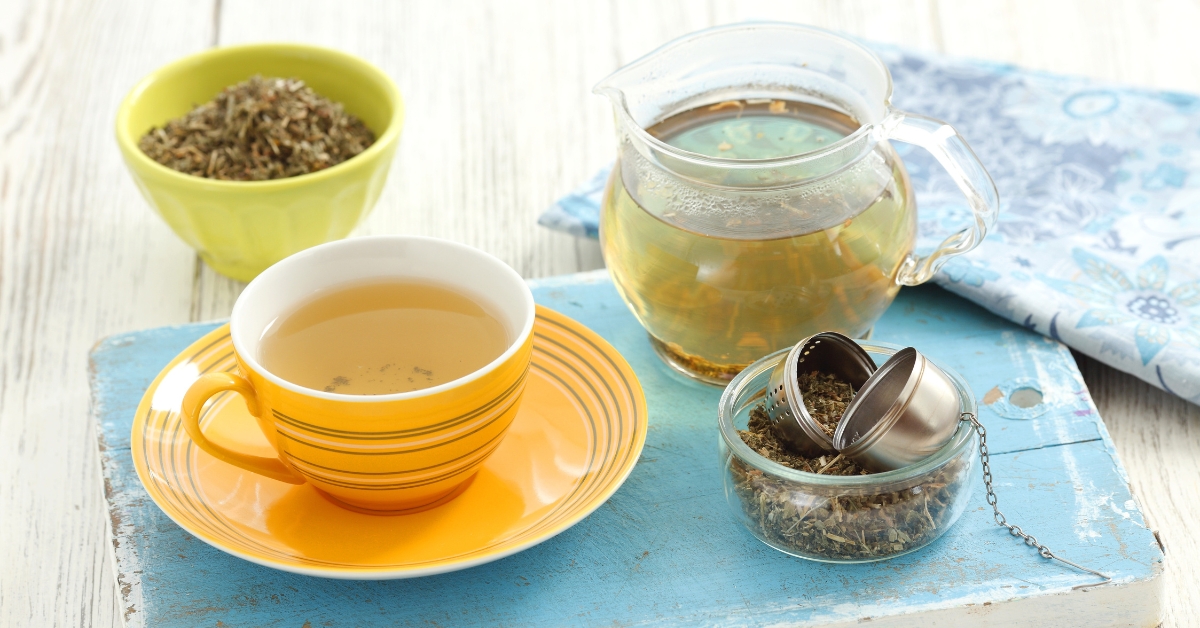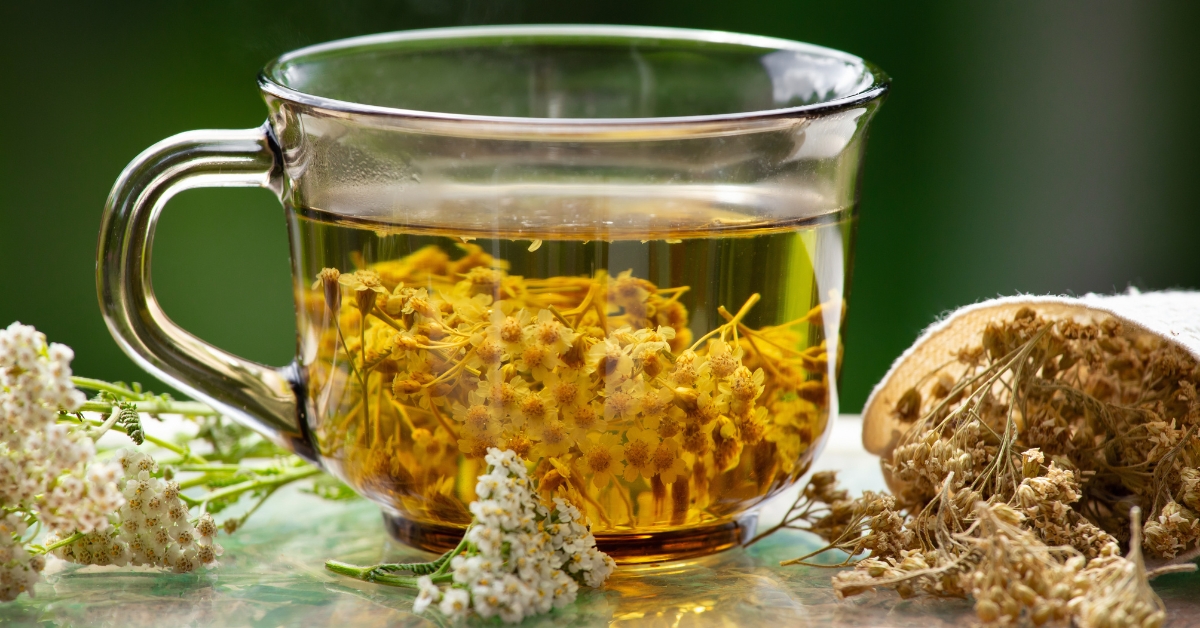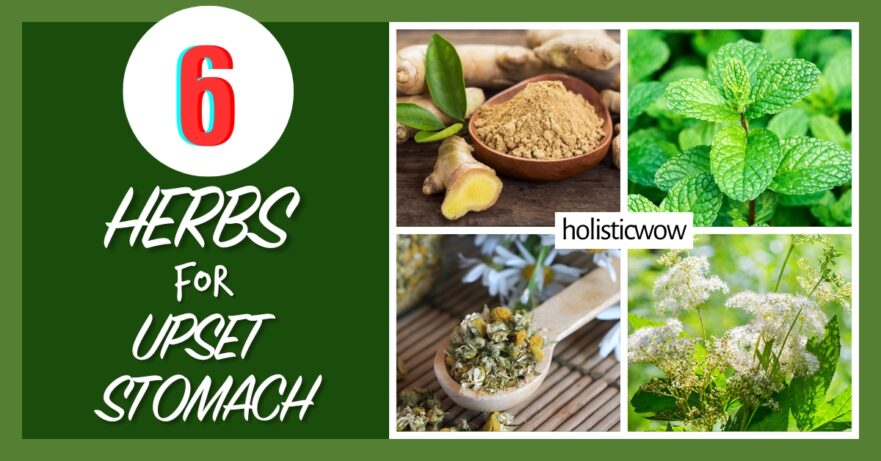In this article about herbs for upset stomach:
🌿 Best Herbs for Upset Stomach | 📜 Herbal Preparations and Recipes for Upset Stomach | ☯️ Integrating Herbs into Daily Life for Upset Stomach Relief | 🌱 Navigating Herbs Safely
An upset stomach is a common digestive issue that can cause discomfort, nausea, bloating, and occasional diarrhea or constipation. These symptoms can interfere with daily activities and overall well-being, making relief a priority for many people.
Herbs like ginger, peppermint, and chamomile offer natural solutions for stomach discomfort. These plants contain compounds that can reduce inflammation, ease nausea, and promote healthy digestion, providing relief without harsh side effects.
We explore six effective herbs for upset stomach, their benefits, and how to use them safely. You’ll learn practical ways to incorporate these natural remedies into your routine for better digestive health.
Key Takeaways
- 🫚 Ginger’s Powerful Effects: Ginger effectively reduces nausea and inflammation in the digestive tract, making it especially useful for indigestion and vomiting relief.
- 🌱 Peppermint’s Soothing Properties: Peppermint relaxes stomach muscles, helping to alleviate cramps, bloating, and digestive discomfort.
- 🌼 Chamomile’s Calming Action: Chamomile tea calms the digestive system and is particularly beneficial for stress-related stomach issues and mild indigestion.
- 🍵 Herbal Tea Blends: Combining herbs like ginger, peppermint, and chamomile creates potent, natural remedies for various forms of stomach discomfort.
🌿 Best Herbs for Upset Stomach
An upset stomach is a common digestive issue that can cause discomfort and interfere with daily activities. This condition encompasses a range of symptoms, such as nausea, bloating, gas, indigestion, and occasional diarrhea or constipation. Ginger (Zingiber officinale), peppermint (Mentha × piperita), chamomile (Matricaria chamomilla), slippery elm (Ulmus rubra), meadowsweet (Filipendula ulmaria), and agrimony (Agrimonia eupatoria) are herbs traditionally used to address these symptoms. However, scientific evidence varies in strength for each herb. Ginger and peppermint have the strongest evidence supporting their use for digestive discomfort, particularly for nausea and bloating.
An upset stomach can result from various factors such as eating too quickly, consuming spicy or fatty foods, stress, or mild food intolerances. The discomfort typically starts in the upper abdomen and may be accompanied by a feeling of fullness. Some people experience a burning sensation in the chest, known as heartburn. In more severe cases, an upset stomach can lead to vomiting or abdominal pain.
While occasional upset stomachs are common and usually resolve on their own, persistent or severe symptoms may indicate an underlying condition, such as gastroesophageal reflux disease (GERD), peptic ulcers, or irritable bowel syndrome (IBS). Understanding the symptoms and potential causes of an upset stomach can help manage this condition and help you know when to seek further medical advice. If symptoms like vomiting, severe pain, or unexplained weight loss occur, it’s important to consult a healthcare professional for proper diagnosis and treatment.
Ginger (Zingiber officinale)
Ginger (Zingiber officinale) has been used for centuries in traditional medicine for its anti-inflammatory and antioxidant properties. It contains active compounds, gingerols, and shogaols, which have been shown to reduce nausea, vomiting, and stomach discomfort. Scientific studies support ginger’s effectiveness, particularly for nausea related to pregnancy, chemotherapy, and postoperative recovery [1]. It works by promoting gastric motility, helping food pass more efficiently through the stomach, which can relieve symptoms like indigestion and bloating. For example, one study found that ginger significantly accelerates gastric emptying, improving digestive function [2]. Ginger also has potential antimicrobial properties, though more human studies are needed to confirm its ability to fight harmful gut bacteria. For upset stomachs, ginger is commonly consumed as a tea, in capsules, or chewed raw. Many people find ginger tea or candies soothing for indigestion and nausea. While generally safe, high doses (over 4 grams daily) may cause mild side effects like heartburn or interfere with blood-thinning medications.
Peppermint (Mentha × piperita)
Peppermint (Mentha × piperita) has been used for centuries to treat digestive issues. Its key ingredient, menthol, has antispasmodic properties that help relax muscles in the gastrointestinal tract, reducing cramping, bloating, and gas. While peppermint tea is a common remedy for mild stomach upset, peppermint oil capsules have stronger evidence for relieving irritable bowel syndrome (IBS) symptoms. Studies show that peppermint oil capsules, particularly enteric-coated ones, are more effective than placebo for IBS relief, including reducing abdominal pain and discomfort [3] [4] [5]. However, peppermint may aggravate acid reflux in some people, with heartburn being a common side effect. Additionally, peppermint oil may interact with medications for acid reflux or diabetes, so it’s best to consult a healthcare provider before use.
Chamomile (Matricaria chamomilla
Chamomile (Matricaria chamomilla) is a daisy-like plant used as a natural remedy for thousands of years. Known for its calming effects, chamomile contains compounds like bisabolol and chamazulene, which have anti-inflammatory and antispasmodic properties. Chamomile is particularly helpful for digestive issues by relaxing muscles in the digestive tract, and easing cramps and spasms [6]. Chamomile also has mild sedative effects, which can help relieve stress-related stomach problems. Drinking chamomile tea is a common way to soothe nausea, indigestion, and general stomach discomfort. According to studies, chamomile’s anti-inflammatory properties may support its traditional use in gastrointestinal health, although more research is needed to confirm its full range of benefits [7]. Chamomile is generally safe for most people, including children and pregnant women, but high doses during pregnancy should be avoided due to limited safety data.
Slippery elm (Ulmus rubra)
Slippery elm (Ulmus rubra) is a tree native to North America whose inner bark has been used medicinally for centuries. Its inner bark contains mucilage, a substance that forms a gel when mixed with water. This gel can coat and soothe the digestive tract, and when combined with other herbs, it has been shown to improve symptoms related to gastric irritation, GERD, and irritable bowel syndrome [8]. Slippery elm works by creating a protective layer over irritated tissues, which can reduce inflammation and promote healing. It is commonly taken as a powder mixed with water, in capsule form, or as a tea. Studies support its use alongside other herbs like peppermint and licorice for improved digestive health [9]. While generally safe, slippery elm may interfere with the absorption of certain medications. Experts recommend waiting at least 2 hours between taking slippery elm and other medications to avoid this issue.
Meadowsweet (Filipendula ulmaria)
Meadowsweet (Filipendula ulmaria) is a perennial herb native to Europe and Western Asia, traditionally used for relieving pain and soothing digestive issues. Meadowsweet contains salicin, a compound that the body converts into salicylic acid, similar to the active ingredient in aspirin. While there is limited evidence supporting its role as an antacid, meadowsweet’s anti-inflammatory and soothing effects on the digestive tract may help with symptoms like upset stomach and mild indigestion. Its use as a natural remedy for peptic ulcers has also been explored due to its mucoprotective properties [10]. Meadowsweet can be consumed as a tea or tincture to help alleviate digestive discomfort. However, people with aspirin sensitivity should avoid meadowsweet due to its salicylate content, and it should be used with caution by those taking blood-thinning medications due to potential interactions.
Agrimony (Agrimonia eupatoria)
Agrimony (Agrimonia eupatoria) is a perennial herb traditionally used for its astringent and anti-inflammatory properties, which make it beneficial for digestive issues. It contains tannins, which help reduce inflammation in the digestive tract and tighten tissues, making it useful for managing conditions like diarrhea. It also has mild bitter properties that can stimulate digestion and improve appetite [11]. For digestive discomfort, agrimony is typically consumed as a tea or tincture. Many people find drinking agrimony tea after meals helps prevent indigestion and promote healthy digestion.
📜 Herbal Preparations and Recipes for Upset Stomach
These herbal tea blends are designed to soothe and support digestive health naturally. Combining herbs like peppermint, chamomile, and ginger, these recipes target symptoms such as bloating, indigestion, and nausea. Each blend varies in potency to address different levels of discomfort, from mild upset stomachs to more acute digestive distress. As with any herbal regimen, it’s important to consult a healthcare provider before use, especially if you have underlying health conditions or are taking medications.

Soothing Mint Blend
Ingredients:
- 1 teaspoon dried peppermint
- 1 teaspoon dried chamomile
- ½ teaspoon dried ginger root
- 1 cup of boiling water
Preparation:
- Mix herbs in a teapot.
- Pour boiling water over herbs and steep for 10 minutes.
- Strain and drink up to 3 times daily to ease mild stomach discomfort and nausea.

Gentle Digestive Aid
Ingredients:
- 1 teaspoon dried chamomile
- ¾ teaspoon dried meadowsweet
- ½ teaspoon dried slippery elm bark
- 1 cup of boiling water
Preparation:
- Combine herbs in a tea infuser.
- Steep in boiling water for 15 minutes.
- Strain and drink 30 minutes before meals to soothe the digestive tract and support digestion.

Stomach Comfort Tea
Ingredients:
- 1 teaspoon dried peppermint
- ½ teaspoon dried ginger root
- ½ teaspoon dried agrimony
- ½ teaspoon dried meadowsweet
- 1 cup of boiling water
Preparation:
- Mix herbs in a teapot.
- Add boiling water and steep for 10-15 minutes.
- Strain and drink up to 2 times daily to relieve bloating, gas, and indigestion.

Digestive Harmony Blend
Ingredients:
- 1 teaspoon dried chamomile
- 1 teaspoon dried slippery elm bark
- ½ teaspoon dried ginger root
- ½ teaspoon dried agrimony
- 1 cup of boiling water
Preparation:
- Combine all herbs in a tea infuser.
- Steep in boiling water for 15 minutes.
- Strain and drink once daily, preferably in the evening, to promote overall digestive health and relieve stomach discomfort.

Potent Stomach Soother
Ingredients:
- ½ teaspoon dried meadowsweet
- ½ teaspoon dried peppermint
- ½ teaspoon dried ginger root
- ½ teaspoon dried chamomile
- ½ teaspoon dried slippery elm bark
- 1 cup of boiling water
Preparation:
- Mix all herbs in a teapot.
- Pour boiling water over the herbs and steep for 15-20 minutes.
- Strain and drink up to 3 times daily for acute stomach upset, including nausea, cramping, and indigestion.
These herbal tea blends are designed to address various symptoms of upset stomach. Always start with the milder blends and increase potency as needed. Consult with a healthcare provider before starting any new herbal regimen, especially if you have existing health conditions or are taking medications.
☯️ Integrating Herbs into Daily Life for Upset Stomach Relief
Incorporating herbs into your daily routine can provide gentle and effective relief for an upset stomach. Here are practical tips for using ginger, peppermint, chamomile, slippery elm, meadowsweet, and agrimony, along with complementary practices to enhance their benefits.
Daily Use and Lifestyle Integration
- 🫖 Morning Herbal Tea: Start your day with a cup of ginger or peppermint tea to prepare your stomach for the day ahead. This can become a soothing morning ritual that supports your digestive health.
- 🧋 On-the-Go Tea: Keep a thermos of chamomile or peppermint tea handy throughout the day. Sipping this blend can provide ongoing support for your digestive system, especially during stressful periods or after meals.
- ☕ For Acute Discomfort: For acute stomach discomfort, prepare a tea blend of ginger, peppermint, and chamomile. This combination can be particularly helpful when experiencing nausea, bloating, or indigestion. These herbs have proven antispasmodic and carminative properties, making them effective for mild digestive discomfort.
- 💚 Portable Remedies: Consider keeping some ginger candies or peppermint tea bags in your bag or at your desk for quick relief when you’re away from home. These are safe for occasional use and can provide quick relief for mild nausea.
- 💊 Capsules as an Alternative: If you prefer not to drink tea, slippery elm, and ginger are available in capsule form and can be taken with meals to support digestion. Be mindful of the dosage and follow the instructions on the packaging to avoid excess intake.
Additional Practices to Support Digestive Health
- 🥦 Dietary Adjustments: Incorporate foods that are gentle on the digestive system, such as bananas, rice, and toast (the BRAT diet). Avoiding spicy, fatty, or acidic foods can help prevent stomach upset. These food types have low irritation potential for the digestive tract.
- 🫗 Hydration: Drink plenty of water throughout the day to stay hydrated. If you’re experiencing diarrhea, drink oral rehydration solutions to replace lost electrolytes. This helps prevent dehydration and electrolyte imbalance, which can exacerbate digestive issues.
- 🍴 Mindful Eating: Take time to chew your food thoroughly and eat slowly. This can aid digestion and help prevent overeating, which often leads to stomach discomfort.
- 🧘♀️ Stress Management: Practice relaxation techniques such as deep breathing or gentle yoga. Stress is a known trigger for gastrointestinal issues like irritable bowel syndrome (IBS), so managing stress can be crucial for digestive health.
- 🏃♀️ Gentle Exercise: Regular, moderate exercise like walking can support healthy digestion. However, avoid intense workouts if you’re experiencing stomach discomfort, as they may aggravate symptoms.
- 🥣 Additional Digestive Aids: For some individuals, a small amount of cinnamon in your morning tea or a teaspoon of apple cider vinegar diluted in water before meals may help support digestion. Both cinnamon and apple cider vinegar may have mild digestive-stimulating effects, but use them with caution, as too much can irritate the stomach lining.
Integrating these herbal remedies and practices into your daily life offers a holistic approach to managing an upset stomach. Remember to start with small amounts of herbs to see how your body responds. Consult a healthcare provider before using these remedies, especially if you have pre-existing conditions or are on medications.
🌱 Navigating Herbs Safely
Starting with small doses is the first step when adding herbal remedies to your health routine. This approach lets you see how you respond and adjust amounts for the best effect, keeping safety in mind. While many herbs are safe, everyone’s body reacts differently. If you notice any side effects, it’s important to stop and think about what might be causing them.
Remember, herbs can sometimes interact with prescription medicines. These interactions might make your medicines work too well or not well enough, which is why talking to a healthcare provider or an herbalist is essential. This is especially crucial if you’re pregnant, breastfeeding, taking medications regularly, or have an existing health condition. Getting advice tailored to your situation can help you avoid any unnecessary risks.
For kids and older adults, being extra careful with herbs is important. Their bodies might react more strongly to herbal remedies, and the chance of side effects or interactions could be greater. Before giving herbal treatments to children or elderly family members, getting advice from a professional is a must to ensure their safety.
By being cautious and seeking expert advice when needed, you can make herbal remedies a safe part of your wellness plan. This careful approach allows you to enjoy the benefits of herbs while keeping yourself and your family safe.
We explored six natural herbs commonly used for relieving upset stomach symptoms: ginger, peppermint, chamomile, slippery elm, meadowsweet, and agrimony. Each herb offers unique benefits for digestive health, from reducing nausea and inflammation to soothing the stomach lining and easing cramps.
We provided practical ways to use these herbs, including tea recipes and recommended dosages. It’s important to start with milder blends and increase potency as needed.There are simple ways to integrate these herbal remedies into daily life, such as starting the day with ginger or peppermint tea and keeping chamomile tea handy for ongoing digestive support.
Additionally, we suggests complementary practices to enhance the effectiveness of herbal remedies. These include dietary adjustments, staying hydrated, practicing mindful eating, managing stress, and engaging in gentle exercise. It’s important to have a holistic approach to managing upset stomach, combining herbal remedies with lifestyle changes for optimal digestive health.
While these herbs are generally safe, we advise consulting a healthcare provider before starting any new herbal regimen, especially for those with existing health conditions or taking medications. Some herbs may interact with certain medications or have side effects, highlighting the importance of informed and cautious use.
FAQ
What are the most effective herbs for relieving an upset stomach?
Ginger (Zingiber officinale) and peppermint (Mentha × piperita) are among the most effective herbs for relieving an upset stomach. Ginger has well-documented anti-inflammatory and antiemetic properties, making it particularly useful for nausea and vomiting related to conditions like motion sickness, chemotherapy, and pregnancy. It can be consumed as a tea, in capsule form, or even raw. Peppermint, rich in menthol, provides antispasmodic effects that help relax the smooth muscles of the gastrointestinal tract, relieving cramping, bloating, and gas. Peppermint tea or peppermint oil capsules are common and effective forms of use. Chamomile (Matricaria chamomilla) has calming and anti-inflammatory properties, effectively soothing digestive discomfort, especially for indigestion and mild gastrointestinal irritation. These herbs have been used for centuries, and their effectiveness is supported by both traditional use and modern scientific studies.
How can I safely prepare and use herbal remedies for an upset stomach at home?
Preparing herbal remedies at home for an upset stomach can be done safely and easily. For most herbal teas, use about 1 teaspoon of dried herb per cup of boiling water. Steep for 5-10 minutes, strain, and drink. For fresh ginger, you can also make a decoction by simmering 2-3 thin slices of fresh ginger in water for about 10 minutes. Peppermint and chamomile can be used as single-herb teas or combined for a synergistic effect. If using capsules or tinctures, always follow the dosage instructions on the product label and ensure the product is from a reputable source. It's important to start with small amounts to see how your body responds. While these herbs are generally safe, it's always wise to consult with a healthcare provider before starting any new herbal regimen, especially if you have existing health conditions or are taking medications. Certain herbs, like peppermint, can worsen acid reflux in some people, so caution is advised. Remember, herbal remedies should complement, not replace, professional medical advice.
Are there any potential side effects or interactions I should be aware of when using herbs for an upset stomach?
When using herbs to relieve an upset stomach, it's important to be aware of potential side effects and interactions. Ginger, for instance, is generally safe but can cause mild issues like heartburn or stomach discomfort when taken in large amounts. It can also interact with blood-thinning medications, increasing the risk of bleeding. Peppermint is effective for easing digestive discomfort, but it may aggravate acid reflux in some people by relaxing the lower esophageal sphincter, allowing stomach acid to flow back up. It can also interact with medications for acid reflux and diabetes, so it's important to be cautious if you're taking such medications. Chamomile is another herb often used for digestive relief and is generally considered safe. However, people with allergies to plants in the daisy family, like ragweed, should avoid it, as it can trigger allergic reactions. Chamomile also has mild blood-thinning effects, so individuals on anticoagulant medications should use it with caution. Slippery elm, another popular remedy for stomach issues, can interfere with the absorption of other medications. To avoid this, it's best to take slippery elm at least two hours apart from any other drugs. Meadowsweet, which contains compounds similar to aspirin, should be avoided by individuals with aspirin sensitivity. It may also interact with blood-thinning medications, potentially increasing the risk of bleeding. To use herbs safely, always start with small amounts and discontinue use if you experience any adverse reactions. If you’re pregnant, nursing, or have a chronic health condition, it’s essential to consult with a healthcare provider before introducing herbal remedies into your routine.

